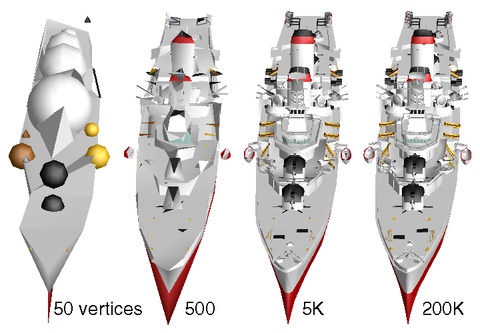Progressive simplicial complexes

ACM SIGGRAPH 1997 Proceedings, 217-224.
Progressive encoding of both topology and geometry.
Abstract:
In this paper, we introduce the progressive simplicial complex (PSC) representation, a new format for
storing and transmitting triangulated geometric models. Like the earlier progressive mesh (PM)
representation, it captures a given model as a coarse base model together with a sequence of refinement
transformations that progressively recover detail. The PSC representation makes use of a more general
refinement transformation, allowing the given model to be an arbitrary triangulation (e.g. any dimension,
non-orientable, non-manifold, non-regular), and the base model to always consist of a single vertex.
Indeed, the sequence of refinement transformations encodes both the geometry and the topology of the model
in a unified multiresolution framework. The PSC representation retains the advantages of PMs. It defines
a continuous sequence of approximating models for runtime level-of-detail control, allows smooth
transitions between any pair of models in the sequence, supports progressive transmission, and offers a
space-efficient representation. Moreover, by allowing changes to topology, the PSC sequence of
approximations achieves better fidelity than the corresponding PM sequence.
We develop an optimization algorithm for constructing PSC representations for graphics surface models, and demonstrate the framework on models that are both geometrically and topologically complex.
We develop an optimization algorithm for constructing PSC representations for graphics surface models, and demonstrate the framework on models that are both geometrically and topologically complex.
Hindsights:
It is an elegant framework for progressively encoding topology, although perhaps overly general for
efficient implementation.
Solutions have since been developed for the case of progressive tetrahedralizations, another interesting
generalization of progressive meshes.
See content copyrights.